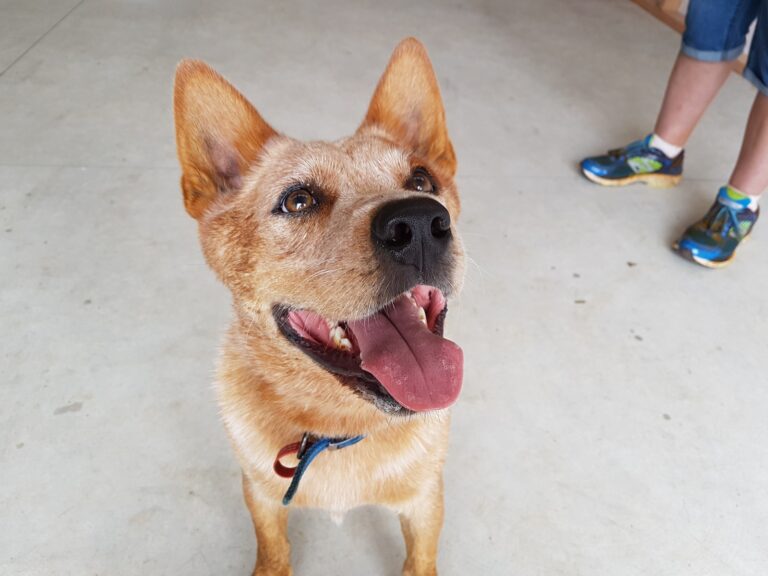10 Fantastic Benefits of Dog Training
Ezra is the third dog I’ve owned in my life and the first dog I’ve attempted any dog training. I expected to quit training after he hit a certain level of obedience or maturity. I thought the only point of training was to have a quiet, calm, and well-behaved dog.
Ezra is not a show dog, and I doubt he’ll star on the silver screen. So why would I care to train for anything beyond decent behavior?
My mindset completely changed when I learned what it means to train a dog. I was hooked. It was so cool to finally have a relationship with my dog that is founded completely on communication and trust. It’s a relationship that can keep growing as we learn more and more. To this day, I can’t get enough training and I am interested in taking any training class I can with him.

Is dog training necessary?
To a degree, yes. You do need to train your dog to go to the bathroom outside, be nice to strangers, and not destroy the house. But the level of training your dog needs depends on your lifestyle requirements and the dog you have.
For example, leash training may not be necessary to all dog owners. Small and toy breeds don’t need to walk nicely on a leash. But medium to giant dogs should learn how to walk on a leash. And even though they should, it’s not a law. Dog owners can choose not to teach their dogs to walk on a leash if it’s not important to them for some reason.
Why should you train your dog?
The main reason to train your dog is to create a longer-lasting and deeper bond with your dog. The reason you can do this is because you can take a well-trained dog with you more regularly than an untrained dog. There will be fewer frustrations, fewer compromises, and more adventures and fun. And you’ll avoid potential disasters along the way.
10 No-Brainer Benefits of Dog Training

Benefit #1: Safety
This one is probably obvious. Big dogs are a big responsibility. If you can’t control your dog, it becomes a safety hazard. For example, let’s say your large dog loves to meet new people. When he meets new people, he gets excited and sometimes jumps. You don’t want your dog to knock someone over and potentially hurt them. It is your responsibility as the dog owner to ensure they stay safe and don’t harm anyone else (even if they don’t intend to).
If you want to train your dog to politely meet strangers, I have a tutorial you can check out.
Benefit #2: Having good manners
This goes hand in hand with safety and helping your dog mature as he grows up. It’s also very similar to how you would raise a kid if you have a kid. For example, young puppies don’t understand how to play or eat gently. They need to be taught to behave that way, just like a small kid needs to be taught please and thank you. It’s possible that they will learn these behaviors naturally over time, but it is not guaranteed. To ensure your puppy grows into a polite adult, it’s good to train these behaviors when they are young.
Benefit #3: Preparing for the worst
You can’t predict the future, but you want to do your best to mitigate any obstacles that may come up. For example, let’s say you bring your dog to the park and somehow he gets off-leash and starts to run off. How would you get your dog back? Will an untrained dog come back when called? Most likely not. Even if you never expect this to happen, it’s possible that it might. It’s always a good idea to train for the worst case scenarios, like losing your dog.
Training a reliable recall can be life-saving if your dog ever gets loose.
Benefit #4: Socialization
Socialization is critical to raising a puppy without fear, aggression, anxiety, over-excitement, or uneasiness around all types of people, environments, or animals. Any of these responses from your dog are negative. To avoid or mitigate them, you need to ensure your puppy is exposed to them from a young age. This helps him become familiar with more environments which is good. This is good because he will be comfortable in more places and have fewer negative reactions out of fear, anxiety, etc. This may not seem like true training, but it’s some of the most important things you can do early on in your puppy’s life.
Benefit #5: Builds confidence
Part of dog training includes practicing your new skills in unfamiliar environments to reinforce the good behavior in any scenario. This means it will introduce the dog to new experiences, new places, or new people. Generally, learning new skills is tough but it is even harder in new environments, particularly for dogs that are uneasy about unfamiliar territory. When dogs learn how to do hard things when they are uncertain, it helps to overcome their fears and boosts their confidence.
Benefit #6: It’s incredibly stimulating
Beyond skill training, there are so many other types of training. There are plenty of types of training that may or may not require verbal commands. They may rely on the dog leveraging his natural instincts, physical abilities, or makes them use their brain. For example, feeding your dog on a snuffle matt teaches your dog to work for their food by using their sense of smell to find it. When dogs exercise all their abilities, it’s a more enriching life for them and keeps them from getting bored.

Benefit #7: Tiring your dog out
It’s exhausting to use your brain to think on your feet and rely on your instincts to solve problems and make judgment calls. This is what you are forcing your dog to do when you train them. It burns a lot of their energy and wipes them out. Tired dogs will not be so interested in doing things they shouldn’t be and will misbehave less. Tired dogs are good dogs.
Benefit #8: Builds trust
Trust is an important part of any relationship. In the beginning, you and your puppy won’t trust each other. For example, in the early days of puppyhood you won’t trust your dog to be home alone without accidents or destroying the house. Your puppy won’t trust that you will come back when you leave. Part of this may be maturity, but it definitely requires practice. Over time, you’ll learn to trust each other. Then you’ll be able to leave the house more frequently or for longer durations and your dog will be comfortable with it. This also extends to other types of behavior, like going on trips or meeting strangers.

Benefit #9: Increasing communication skills
Any good relationship requires solid communication. With dogs, basic training builds the foundation for good communication. House training is a good example of this. In the beginning, you need to take your dog out every few hours and crate him if he can’t be watched. When your dog scratches on the door to go outside, he is communicating with you. In this way, he is communicating with you.
Benefit #10: Giving back to the community
You can train to be a therapy dog team and do volunteer work at local schools, nursing homes, or hospitals. It does take months or even years of training to get to that point, and not all dogs are capable of therapy work even with training. But even if you don’t want to go that far, there are simple tricks you can teach your dog at home that will delight a crowd. It’s surprisingly easy to teach your dog to give a high five or shake your hand. Kids love it!
Conclusion
Ultimately, the more you train your dog, the closer you and your dog grow. You’ll be able to go more places completely care-free. It’s all about having fun and making memories with your dog.


![59 Tips for First Time Dog Owners from 155 Dog Owners [2023]](https://www.bigdogtails.com/wp-content/uploads/2023/01/rectangle-768x1365.png)




